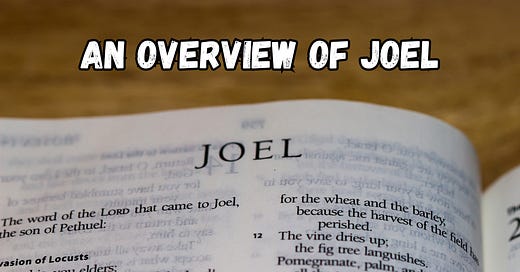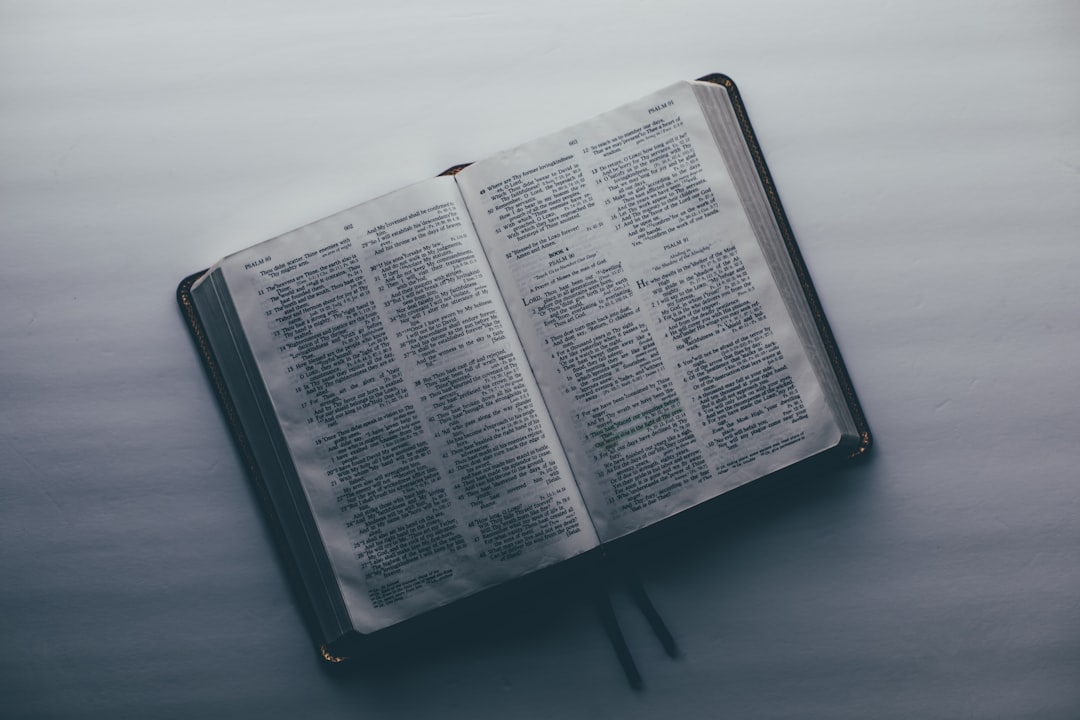Have you ever heard a sermon that used current events, perhaps a disaster of some sort, to point people to an even greater problem in their lives?
That’s pretty much what the book of Joel does.
Joel prophesied to the southern nation of Judah sometime before the Babylonian captivity.
The southern kingdom of Judah was experiencing a locust plague that was causing destruction on a level they had never witnessed – and Joel used the current disaster to call attention to the spiritual condition of the people.
An Outline of Joel.
“Have you ever experienced anything like this locust plague before?” (1:1-12).
“You need to humble yourselves and repent because the day of the Lord is near” (1:13-20).
“In a similar way to this locust plague, the day of the Lord will be unlike anything you’ve ever experienced” (2:1-11).
“So return to the Lord, because He wants to spare you” (2:12-17).
“All who return to the Lord will rejoice in His mercy and salvation” (2:18-32).
“All who oppose the Lord will have His judgment poured out upon them (3:1-16).
“The Lord who dwells in Zion will live forever with His faithful people” (3:17-21).
Five Lessons from Joel.
1) Repent while you can before something worse occurs (2:1-2).
Blow the trumpet in Zion, And sound an alarm in My holy mountain! Let all the inhabitants of the land tremble; For the day of the LORD is coming, For it is at hand: A day of darkness and gloominess, A day of clouds and thick darkness, Like the morning clouds spread over the mountains. A people come, great and strong, The like of whom has never been; Nor will there ever be any such after them, Even for many successive generations.
While the locust plague had been destructive in Judah, if they refused to repent, something far worse would come upon them in the form of an invading foreign army.
Jesus warned the lame man He healed not to return to sin lest something worse come upon him (John 5:14).
There is something worse than physical pain and hardship. Dying in our sins will be much worse than anything we experience in this life. And once this life is over, there will be no more opportunities to repent (Luke 16:19-31).
2) Repentance takes place in the heart (2:12-13).
"Now, therefore," says the LORD, "Turn to Me with all your heart, With fasting, with weeping, and with mourning." So rend your heart, and not your garments; Return to the LORD your God, For He is gracious and merciful, Slow to anger, and of great kindness; And He relents from doing harm.
God pled with Judah through His prophet Joel to turn back to Him with their whole heart and not to make an outward show of repentance. He wanted to shower His grace and mercy upon them, but that required Judah to return to Him.
It is a godly sorrow over sin that produces repentance in a person’s life.
Now I rejoice, not that you were made sorry, but that your sorrow led to repentance. For you were made sorry in a godly manner, that you might suffer loss from us in nothing. For godly sorrow produces repentance leading to salvation, not to be regretted; but the sorrow of the world produces death. (2 Corinthians 7:9-10)
When we are convicted of our sins, repenting is the proper response. Peter told the crowd on Pentecost to repent after they had been convicted of their sin.
Now when they heard this, they were cut to the heart, and said to Peter and the rest of the apostles, "Men and brethren, what shall we do?" Then Peter said to them, "Repent, and let every one of you be baptized in the name of Jesus Christ for the remission of sins; and you shall receive the gift of the Holy Spirit. (Acts 2:37-38)
3) The call to repent is an urgent message (2:15-16).
Blow the trumpet in Zion, Consecrate a fast, Call a sacred assembly; Gather the people, Sanctify the congregation, Assemble the elders, Gather the children and nursing babes; Let the bridegroom go out from his chamber, And the bride from her dressing room.
Judah could not delay their repentance until they were “good and ready.” God essentially tells them to “sound the alarm.” This was such an urgent matter that everything else needed to be put on hold.
When we realize repentance is necessary, we shouldn’t put it off. Turning back to God is an urgent matter.
Working together with him, then, we appeal to you not to receive the grace of God in vain. For he says, “In a favorable time I listened to you, and in a day of salvation I have helped you.” Behold, now is the favorable time; behold, now is the day of salvation. (2 Corinthians 6:1-2)
We must not harden our hearts against Him when we hear God's word. We ought to respond “today” to His word.
For he is our God, and we are the people of his pasture, and the sheep of his hand. Today, if you hear his voice, do not harden your hearts, as at Meribah, as on the day at Massah in the wilderness… (Psalm 95:7-8)
4) God does not want anyone to face “disaster” for their sins (2:18-19).
Then the LORD will be zealous for His land, And pity His people. The LORD will answer and say to His people, "Behold, I will send you grain and new wine and oil, And you will be satisfied by them; I will no longer make you a reproach among the nations.
God wanted to bless Judah - and He promised He would if they would return to Him. He did not want to see disaster brought upon them.
God does not eagerly wait for people to be condemned for their sins. God receives no pleasure in the death of the wicked.
"Therefore I will judge you, O house of Israel, every one according to his ways," says the Lord GOD. "Repent, and turn from all your transgressions, so that iniquity will not be your ruin. Cast away from you all the transgressions which you have committed, and get yourselves a new heart and a new spirit. For why should you die, O house of Israel? For I have no pleasure in the death of one who dies," says the Lord GOD. "Therefore turn and live!" (Ezekiel 18:30-32)
The Scriptures clearly say that God wants everyone to repent and not perish for their sins.
The Lord is not slow to fulfill his promise as some count slowness, but is patient toward you, not wishing that any should perish, but that all should reach repentance. (2 Peter 3:9)
5) The mercy, love, and blessings of God are demonstrated in His Son (2:28-32).
"And it shall come to pass afterward That I will pour out My Spirit on all flesh; Your sons and your daughters shall prophesy, Your old men shall dream dreams, Your young men shall see visions. And also on My menservants and on My maidservants I will pour out My Spirit in those days. "And I will show wonders in the heavens and in the earth: Blood and fire and pillars of smoke. The sun shall be turned into darkness, And the moon into blood, Before the coming of the great and awesome day of the LORD. And it shall come to pass That whoever calls on the name of the LORD Shall be saved. For in Mount Zion and in Jerusalem there shall be deliverance, As the LORD has said, Among the remnant whom the LORD calls.
Joel prophesied of a time when “whoever calls on the name of the LORD shall be saved.” In the short term, he urged them to return to God for deliverance. But this prophecy pointed forward to the time when people would turn to Jesus for salvation.
God doesn’t just “wish” people will be saved and turn from their sins. He has sacrificed tremendously so sinners might be saved. God’s love and mercy have been displayed in the sacrifice of His Son Jesus.
For while we were still weak, at the right time Christ died for the ungodly. For one will scarcely die for a righteous person—though perhaps for a good person one would dare even to die— but God shows his love for us in that while we were still sinners, Christ died for us. (Romans 5:6-8)
It is in His Son that all spiritual blessings are found. God wants to bless everyone - but His blessings are extended through Jesus.
Blessed be the God and Father of our Lord Jesus Christ, who has blessed us in Christ with every spiritual blessing in the heavenly places… (Ephesians 1:3)
The message of Joel considers disasters and how much suffering they cause, and he directs sinners’ attention to “the day of the Lord.” Sinners are urged to repent and turn to God before it’s too late.
God has extended His grace and mercy to all – but if He is rejected, His judgment will be unlike anything ever experienced.







On a less important note, and in the event you might be interested, I was helped in my understanding of the locust in Joel when I discovered National Geographic's December 1915 article, "Jerusalem's Locust Plague" by John Whiting. In that year, Jerusalem was hit with something very much akin to what is described by Joel. The subtitle for the article is, "Being a Description of the Recent Locust Influx into Palestine, and Comparing Same with Ancient Locust Invasions as Narrated in the Old World's History Book, the Bible." It is an extensive write-up, with amazing photos (though black and white), and quotes from Joel extensively. I ended up purchasing an old copy, but seems like a brother may have found a pdf somewhere online. Anyway, was glad to have it when teaching the book. Laura Ingalls Wilder's description (in On The Banks of Plum Creek) of the behavior of the grasshoppers--the Rocky Mountain locust--that consumed everything in Minnesota (and elsewhere) in the 1870s is also useful--astonishingly just like that described in Joel.
The 1915 Jerusalem Locust Plague
https://www.loc.gov/collections/american-colony-in-jerusalem/articles-and-essays/the-locust-plague-of-1915-photograph-album/
https://www.loc.gov/resource/mamcol.058/?sp=1&st=image
The 1870s North American Locust Plague
https://lithub.com/laura-ingalls-wilder-and-the-greatest-natural-disaster-in-american-history/
Amen!!